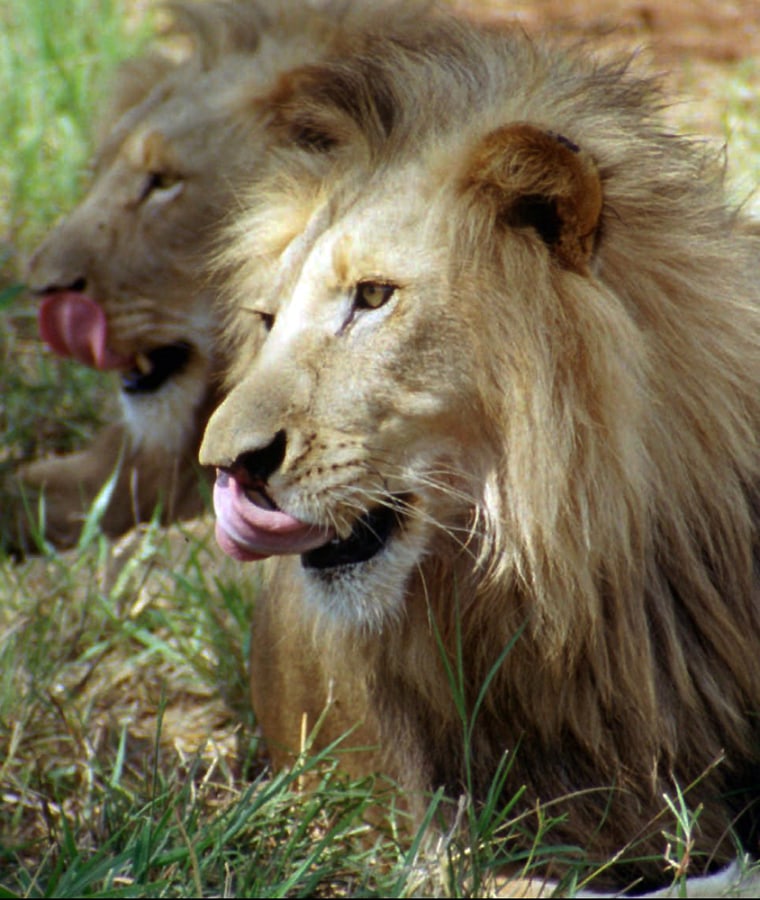Lions bred in captivity to be shot and killed by a pleasure-seeking tourist. Rhinos felled by bow and arrow for fun. Zebras bred with donkeys to slow their escape from hunters.
A panel of experts highlighted the darker side of South Africa’s booming wildlife industry Tuesday and recommended a total ban on “canned hunting” — the release of captive-bred animals to be killed for sport with no chance of escaping their human predators.
Environment Minister Marthinus van Schalkwyk said the government would introduce legislation next year to salvage South Africa’s reputation as an international haven for wildlife.
“We want to stop the approach of ‘anything goes’ in terms of hunting and crossbreeding,” said van Schalkwyk, himself an avid hunter. “Some practices which have been developed over years and decades are distasteful and despicable.”
South Africa is famed for its teeming animals and brilliant birds. The jewel in the conservation crown, Kruger National Park, draws millions of camera-toting visitors each year.
But in the shadow of Kruger — where all hunting is outlawed — smaller parks have sprung up, aimed at visitors who carry rifles. Last year, an estimated 6,700 tourists killed nearly 54,000 animals.
Faced with mounting public concern, van Schalkwyk convened a panel of environmental conservation and management experts in April to look into the industry and suggest ways of regulating it.
Menagerie of victims
Documents provided to the panel by the Traffic wildlife trade monitoring network provided details on the extent of the “trophy” hunting business.
It said 190 lions were hunted last year by foreign tourists, worth an estimated $3.3 million — or $17,500 each. Nearly 5,500 kudus — valued at $5.3 million in all — also were killed, along with 45 leopards worth an estimated $250,000.
The list of slain animals included baboons, giraffes, elephants, hippopotamuses, mongooses, porcupines, warthogs and zebras. Prices paid ranged from $25 for the humble pigeon or quail to $25,000 for the mighty white rhinoceros.
Some hunters were offered the chance to shoot large mammals, including rhinoceroses, with bows and arrows, condemning them to a long and painful death, the panel found.
“This is something that no civilized country can continue to tolerate,” van Schalkwyk said.
Importing, breeding for sport
To satisfy the insatiable demand of foreign hunters, game parks resorted to importing boars from Russia and tahrs from the Himalayas, the panel said.
Breeders also used crossbreeding and genetic manipulation to make the potential prey more appealing — for instance, by introducing more albino strains in lions. This could have devastating implications for long-term biodiversity in South Africa, the panel said.
One of the most extreme examples quoted was that of the “zonkey,” a crossbreed between the fleet-footed zebra and the slower-moving donkey.
The panel concluded that hunting is — and should remain — an integral part of South African life because of its importance to the economy and employment. Hunting kudu and other game to make “biltong” — a popular local dried meat — is one of a number of entrenched traditions, it said.
But the panel said there must be more controls, greater self-regulation and a concerted attempt to transform the white-dominated hunting industry into a multiracial business that benefits more sectors of society.
Crispian Olver, chairman of the expert panel, said implementation of its recommendations would help repair South Africa’s tarnished image among environmentalists and animal rights groups.
“We would be able to stand proud among the nations of the world and no longer be ashamed of our hunting,” he said.
